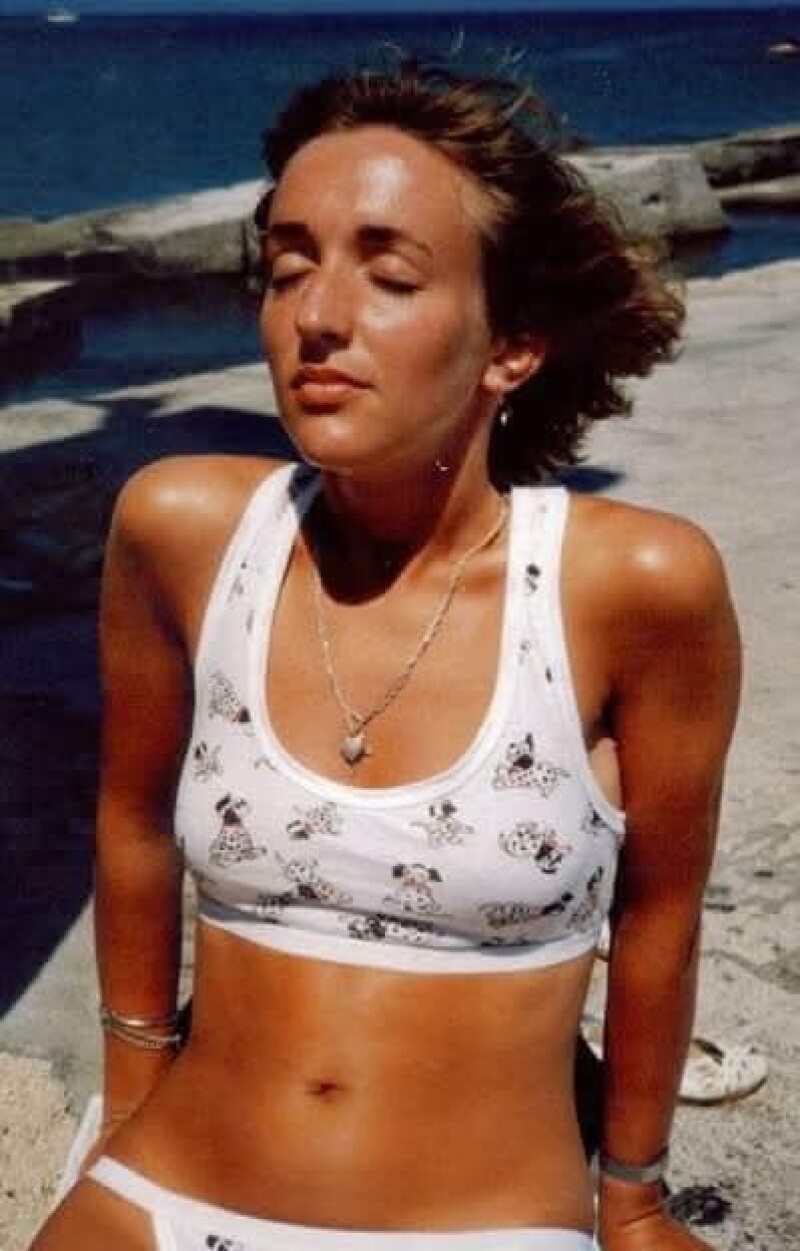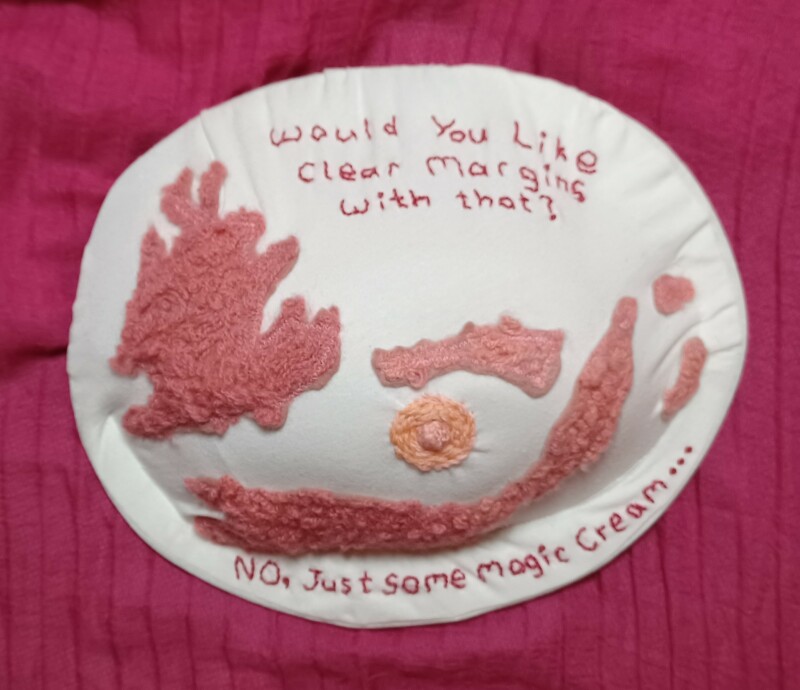Denise Bates, 59 from Liverpool living in Birmingham, married, 2 sons 20 and 25. Used to work in NHS finance, now loves sewing, variegated thread, tea and cake!
“I was first diagnosed with Liver Cancer in 2014. After recovering from a resection, I was told it had spread to my lungs and that I was now terminal when my boys were 10 and 14. I pushed and advocated for treatment from the start, first Tace and then in 2016 I started a clinical trial for immunotherapy, which were the amazing new drugs being trialled for many different cancers.
Immunotherapy uncloaks the tumours and harnesses your own immune response to destroy them. For me it worked, I went from stage 4 incurable to no evidence of disease and 7 years on I’m still clear of liver cancer and its mets. However whilst on the trial a small tumour was spotted in my right breast which didn’t respond to the immunotherapy.That was my primary breast cancer. Treated after the trial finished with a lumpectomy and radiotherapy in 2019, it returned in 2022 as a tnbc tumour in the lymph nodes in my neck.
I’m now on 3rd line treatment Trodelvy, after some palliative radiotherapy. It has also come back as a skin metastasis for the second time. I've been offered steroid cream and a toilet mastectomy within the same consult - 2 extreme ends of the treatment scale, so have now had a second opinion and am trying to access electrochemotherapy. It has taken 4 months from the skin met recurrence to now, 4 months of advocating, suggesting alternatives and discovering that treatment available for skin cancer is not available for breast cancer in the skin and that the treatment I do need is available locally but no-one in Oncology suggested it?
Unfortunately the area involved is now also too large for electrochemotherapy due to the way the treatment kills off the skin surface. Next option? Possibly a change of chemo, maybe add in immunotherapy - but having had Immunotherapy already for 2 years for liver cancer I may not be allowed access for breast cancer.
Living with cancer for over 10 years can leave you increasingly angry and frustrated.
Surviving one terminal cancer diagnosis does not make the second one any easier, but it does give you the tools to navigate the medical system and what to push for. It also gives you, perhaps naively, hope that you can outwit this one as well. The Cancer type doesn’t matter, once you’re put in the stage 4 category, given that label, it’s interesting how some professional attitudes alter. It should be about helping you to live as long as possible as well as possible. It’s a frustrating place to be, we are excluded from trials because we’ve had too many lines of treatment - that can be as little as 2. We can’t access some treatments as they haven’t been trialled for breast cancer but they won’t trial us as they think we don’t live long enough. We’re not counted in statistics until we’re dead - so how do they know what is and isn’t working for each breast cancer subtype, how do they plan services with no data collection?
There are so many innovative treatments out there but that stage 4 label clouds the waters and shuts down our access. Treatments proven to work in other countries have to go through the trial process again in this country - we the patients haven’t got that time to wait.
It is so tiring having to advocate for the best possible treatment for you, for your circumstances, but if I hadn’t or don’t continue to, my life would be cut short - I’d have reached my use by date in 2015 not exceeded it by 10 years. Happily, it has given me a group of friends in the same situation, who totally get what you’re going through, with whom you can share the worst of it, the things you can’t talk to friends and family about.
It is maybe a characteristic of getting older, but I actually don't really care about the little things anymore. It's more important to be there for people, to spend time together than clean the house or go shopping for stuff you don't need. It also gives you a very dark sense of humour - a bag for life and 10yr guarantees take on a whole new meaning! People usually see you on your good days, when you've done your hair (or wig) and make up, put on a clean shirt!. You get complimented on how well you look, that you must be OK because you’re out and about. What they don't see is either the bad days when fatigue means you can't physically or mentally function or what lies beneath the presentable appearance.
I recently took part in the photoshoot for this year’s Make 2nds Count Truth be Told campaign that will be shared as part of their Breast Cancer Awareness Campaign in October. I thought of it as ‘What lies Beneath’ - all the parts of us that people don’t see, so assume we’re good but we deal with daily, hourly and usually in the wee small hours when everything seems worse.
My treatment is for life, no my hair won’t grow back whilst I’m on this for life treatment.
I can’t wear a bra as it sits on my skin met and rubs.
The picc line which has to be covered in the shower and means you can’t go swimming, immerse in the bath and float away.
How many pills you take or stuff you carry with you for ‘just in case’ emergencies.
The scars which can itch or pull and restrict movement.
The lymphoedema which makes clothing tight.
The crippling joint pain from an injection which boosts your blood count so you can have more treatment.
What a breast cancer skin metastasis can look like. It’s not one of the common recurrences - what starts as a small innocent red patch can become red and angry, at the moment it peels, scabs and itches and has shooting pain. If seeing it alerts one person to get checked or an Oncologist to know how to treat it quickly then those photos will be worth it.
We hide a lot, emotionally, mentally and physically living with this disease. We are constantly adapting to a new normal with each set of results or new side effects. And each time our world usually shrinks a bit more - perhaps you can’t walk or drive as far as before, or retiring to the coast is now no longer practical as you need a large hospital with a good oncology unit close by - an A&E within 20 mins is apparently a recommendation.
Secondary Breast Cancer is not an immediate death sentence, this is so often not explained or understood, stage 4 terminal is a heavy label. We are treatable not curable and the terminal label doesn’t apply until we have ran out of treatment options. Until that point we can live well for a long time. People don’t like to talk about terminal illness - but we’re all going to die, we however have been given the privilege of not putting things off, of making the most of the time we’ve got. Of taking whatever our current normal is and just cracking on with it.
I’m not sure this comes across as a Story of Hope, but it is a story of resilience and just keeping on going. I am angry at what we have to endure. I long to go away for longer than a week between bloods and picc line dressings. If I went to the sea though would I come back! I long for some long-lasting new normal and not another ‘what now’ to deal with? What keeps me going? Being able to reassure newly diagnosed secondary patients that it’s not an immediate end of life situation, that there are multiple options available to them despite how it is depicted by medics or press, but you have to advocate and then advocate some more. A needle and thread, which have turned into textile pieces about my situation.
I’d like to see 60 next year and have a huge afternoon tea with the amazing females I’ve met and who have supported me through these years. I’d like to apologise to my numerous medical teams over the years for always challenging them, but stage 4 is survivable - if you can cure us, you can cure us all. I was told early on that cantankerous people live longer, so I intend to stay cantankerous and challenging and defiant for as long as possible.

